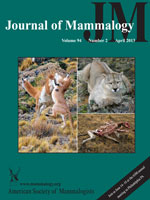Although black bears (Ursus americanus) were believed to be extirpated from the Interior Highlands of North America by the early 1900s, populations have recently recovered, aided in part by reintroductions in Arkansas. Today black bears can be found in the Ozark and Ouachita National Forests of northern and western Arkansas, the White River National Wildlife Refuge in eastern Arkansas, and the Ozark region of southern Missouri. Previous genetic studies have investigated the effects of translocating black bears from Minnesota and Manitoba, Canada, into the Ozark and Ouachita National Forests between 1958 and 1968, with differing results. We used nuclear microsatellite loci to infer the genetic structure of black bears across the Interior Highlands and to investigate the sources of bears found today in southern Missouri. Our results suggest that the Ozark population was strongly influenced by the reintroductions, whereas the Ouachita population was influenced to a lesser degree. Although the majority of bears in the Ozark region of Arkansas and Missouri represent a single genetic unit, bears in Webster County, Missouri, may represent a remnant of the historical population of the region. Our results confirm that the bear population in the White River National Wildlife Refuge is strongly differentiated genetically from other Arkansas populations and support previous reports that the Ouachita bear population may have resulted from an admixture of a remnant population and reintroduced bears.
How to translate text using browser tools
1 April 2013
Origins and genetic structure of black bears in the Interior Highlands of North America
Kaitlyn M. Faries,
Thea V. Kristensen,
Jeff Beringer,
Joseph D. Clark,
Don White,
Lori S. Eggert
ACCESS THE FULL ARTICLE

Journal of Mammalogy
Vol. 94 • No. 2
April 2013
Vol. 94 • No. 2
April 2013
bear
genetic sexing
microsatellites
population structure
reintroduction
translocation
Ursus americanus




